This week in PR (26 October)

About the author
Richard Bailey Hon FCIPR is editor of PR Academy's PR Place Insights. He teaches and assesses undergraduate, postgraduate and professional students.

News in brief
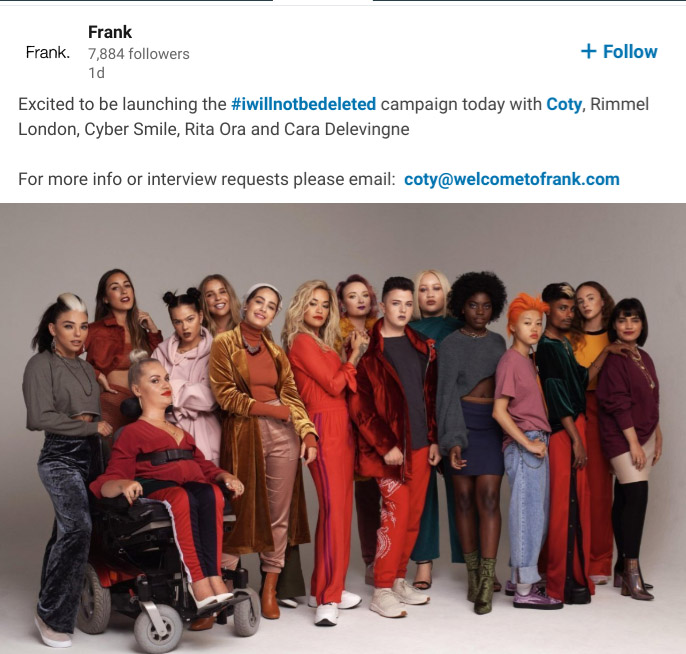
- Nick Clegg is joining Facebook as vice president of global affairs and communications. Writing in The Guardian, the former deputy prime minister explains his decision. ‘We cannot wish away technological progress. Nor can we simply bemoan the social, ethical and political dilemmas raised by the tech revolution.’ Carole Caddwalladr sees this move differently in sister paper The Observer. ‘You don’t seem to have grasped is that the crisis gripping Britain and the one gripping Facebook are one and the same. It isn’t technology that has blown apart our world – it’s Facebook’s business model. It’s the monetisation of fear and hatred and lies.’
- AMEC has launched an agency group, chaired by Grayling’s Jon Meakin, to spread best practice in measurement and evaluation across public relations consultancies.

Academic
- International History of Public Relations Conference, Bournemouth, 26-28 June 2019. Call for papers (deadline 1 February 2019).
- Broadcaster and author Kate Adie has been named as the next chancellor of Bournemouth University.
Insights and opinions: Pick of the posts
These are the editor’s pick of posts about public relations this week (UK focused, but with a global outlook). Recommendations are welcome to editor@prplace.com or @pr_place
Consulting, skills and careers
- Carmen Spinoza: Are you Beast or Beauty? (25 October)
‘Advancing the profession – and advancing your own career – might be easier by focusing less on knowing the latest digital communication tools and focusing more on developing consulting tools.’ - Dan Slee: FOUR LEVELS: Canny steps to take when your good advice gets ignored (25 October)
‘Once you’ve articulated your ideas and they still say no, put it in writing. Politely. Just to re-inforce and formalise the advice. So if and when things blow up you can present it back to them.’ - Paul Cheal with Alan VanderMolen: Smoke Signal Episode 9 – Respectful Disrupter [podcast] (24 October)
‘We need a lot of disruption in our broad industry – marketing services – and specifically in public relations. I look at how we can disrupt our business model and disrupt what we’re doing to make sure we’re keeping pace with the external environment.’ - Nigel Sarbutts: Seven megatrends that are shaping the future of PR (23 October)
‘10 years ago, the agenda for most PR meetings would be dominated by media relations. Now, the work that generates the revenues for agencies will probably range across areas like paid social campaigns, SEO, native advertising, content creation and a number of other activities where earned media is only part of the picture.’ - Nicola Rossi: Three things Nick Clegg should do when he starts his new job at Facebook (22 October)
‘Make your initial recommendations within three months of starting the job. As a new hire with an external perspective, your star quality begins to wane from the moment you set foot in the door.’
Ethics and professionalism
- Jennifer Sanchis: We need to see audiences as content creators to counter disinformation (24 October)
‘As PR professionals and content creators, it is our responsibility to tackle the spreading of false information by strengthening the relationships we develop with our stakeholders.’ - Trevor Young with Andy Green: Andy Green explains the ‘Dublin Conversation’ and why we need to redefine and rejuvenate PR [podcast] (23 October)
‘The worst question you can ask anyone is, “Can we redefine PR?” ‘Cos it’s the most tiresome and tedious question going. And people’s eyes glaze, look up heavenwards. The reality is that they’re asking the wrong question.’ - Robert Phillips: Truth, Power, PR & Pirates (22 October)
‘As Empson and Harari both identify, it is ultimately essential – for business and politics – to understand the relationship between truth and power and to chart an informed and ethical course. A reformed PR industry therefore sits at the epicentre of this potential transformation.’ - Stuart Bruce: Lies, damn lies and facts (19 October)
‘The instinctive reaction of public relations professionals faced with lies and untruths is to immediately rebut them with the truth and facts. The problem is there are numerous academic studies showing that facts aren’t necessarily what convinces people to believe something and are even more unlikely to persuade them to change their minds.’
Public and third sectors
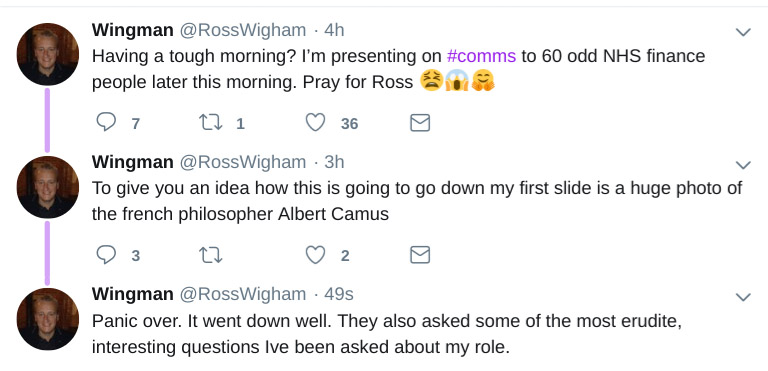
- Ross Wigham: Angels of the north (24 October)
‘Inspired by our famous local landmark we asked the public to use Facebook or Twitter to nominate their own Gateshead Angels and tell us the story of how someone from our organisation had gone the extra mile to help them. This generated more than 750 often heart wrenching stories about the heroic efforts of our staff which were shared by the public online.’ - Amanda Coleman: Communicating to tackle crime (24 October)
‘We now have evidence that communication alone is almost as effective as policing activity but we achieve it at a fraction of the cost. It makes PR and comms a cost effective operational part of policing.’ - Sheena Thomson: Recalibrating the moral compass (22 October)
‘Repairing this damage and restoring public confidence, support and trust is crucial not just from a reputation perspective, but for survival. Ampelforth has seen a decline in enrolment and in June Oxfam confirmed losing out on £16m of funding, leading them to cut programmes and back office staff.’
Gender, diversity and mental health
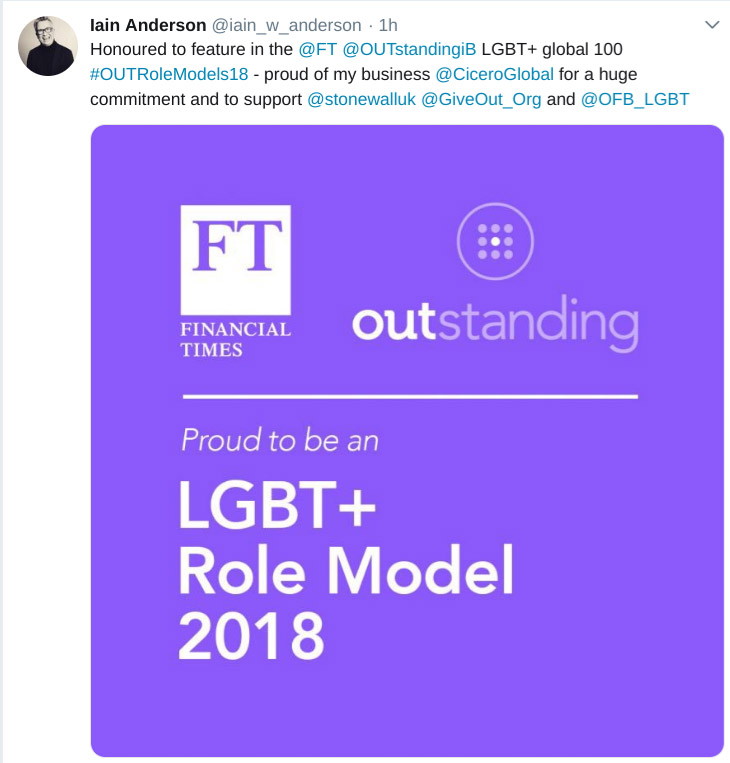
- Claire Mason: How PR can help close the gender SAY gap (25 October)
‘Public relations is an example of a profession and an industry where women have succeeded. There are so many inspiring female business leaders and agency owners, but while women make up two-thirds of the communications workforce, the majority of senior roles are filled by men, so we still have some work to do.’ - Drew Benvie: Wellbeing is all about the Goldilocks approach to social media (23 October)
‘How much screen time is the right amount? 2 hours per day according to recently-published research of more than 120,000 UK teenagers by the University of Oxford.’ - Marcel Klebba: On switching off (21 October)
‘When you’re pondering an idea or battling how to solve an issue, thinking about it all the time won’t help. Forgetting about it and coming back to it with fresh mind is key.’
Influence and community
- Richard Millington: How Fitbit Built An Indispensable Online Community (21 October)
‘By February, over 100,000 members had joined the community, yet the system was working. Members were stepping up and answering each other’s questions. Better yet, the superuser group had also answered the huge backlog of questions. Having shown the concept worked, Leahy was now eager to open the community up to the world.’
Brands and reputation
- Ella Minty: Does reputation really matter when you have power? (25 October)
‘When you have power or provide a niche service, someone will still do business with you regardless of your reputation.’ - Tal Donahue: Reputation in the boardroom: a roadmap for NEDs (23 October)
‘Non-Executive Directors (NEDs) have a key, but as yet not fully-realised, role to play in corporate reputation management.’ - Amy Bell: The problem with the rail industry (23 October)
‘What the general public don’t realise is the amount of work which is going on behind the scenes to help improve the railway. Every year millions of pounds are dedicated to innovation and research, safety and security.’ - Chris Measures: Why sales is the new opportunity for PR and communications (19 October)
‘Essentially you have to build a brand for yourself and/or your product. This has to be built on the right content, in the right places, giving a consistent message to your target markets.’ - Mike Sergeant: Mike on reputation [vlog] (19 October)
‘Reputation is not something that can be controlled or managed directly. But you can influence reputation – with facts and stories.’
Technology and AI
- Hollie Abbott: Breaking down the spooky side of tech (22 October)
‘Ever since Charlie Brooker made us all feel slightly uneasy about the modern world with his Black Mirror series, people are having more conversations and getting more concerned about where technology will eventually take us.’ - Dan Gerrella: AI is here in PR (but it has limitations) (23 October)
‘My overall feeling from the event is that AI is here but there is a long way to go. In the meantime, PR practitioners should use the time to learn and upskill. As with most technologies, there are advantages to being an early adopter.’
Internal communication
- Advita Patel: Measuring for success (25 October)
‘For a long time I’ve been having conversations with fellow IC’ers to think about measurement and how they can use it to influence decisions made at senior management level.’ - Angelos Vasileiou: Internal Crisis Communication and Employee Engagement: A Closer Look at Multinational Companies (23 October)
‘Internal crisis communication has been remarkably neglected both in academia and in professional practice.’ - Donna Fox: He ain’t nothing like I imagined! (22 October)
‘We have a role as communicators to help leaders come to life and convey the real characters behind the job title. They all have a personality, honest, it’s just a case of finding it with some!’ - Fa Mafi: Workplace Culture and Motivation: A Review of Daniel Pink’s Drive (21 October)
‘Pink argues that businesses need to upgrade to Motivation 3.0, which recognises the power of intrinsic motivation, built on the assumption that, besides biological urges and extrinsic motivation, humans also have a desire to learn, to create, and to make the world a better place.’
Media and digital
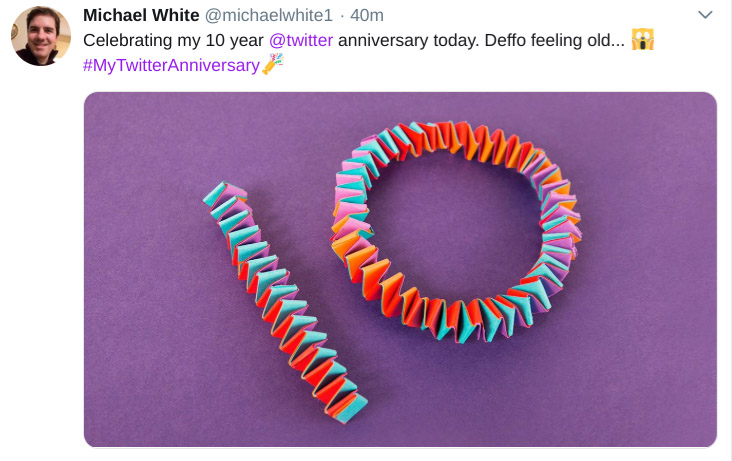
- Paul Sutton with Guy Clapperton: How digital has impacted journalism [podcast] (24 October)
‘What hasn’t helped is GDPR. There are a number of PR companies wary of approaching journalists for the first time now that GDPR has come in. Personally, I think that’s a bit of an extreme reaction, that’s not what GDPR is for.’ - Ronke Lawal: How Elle Magazine Proved That Clickbait and Twitter are Not Always a Winning Combination (20 October)
‘What does it say about Elle’s perception of its core audience and followers if it takes fake celebrity news to encourage people to take something as important as voting seriously?’
#prstudent #bestPRblogs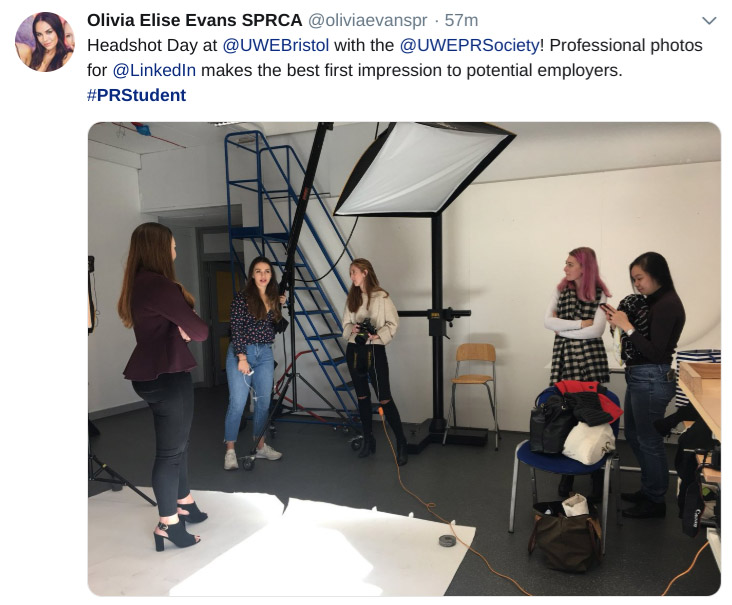
- Lucy Hayball (Bourmemouth): GLAMOUR magazine – leading the way to a digital future? (25 October)
‘I still love picking up a magazine and losing myself for half an hour in it but the reality is, we are in a time of change. We are changing the way we consume media.’ - Yana Miladinova (Bournemouth): 10 Questions With Mary Whenman (25 October)
‘I discovered PR while researching advertising and blagged my way onto a CIPR careers day when I was in the sixth form. I was hooked and decided that it was the career for me.’ - Tracy Bui (Leeds Beckett): What does it mean to be multicultural? A Dutch/Vietnamese perspective [vlog] (25 October)
‘It’s not easy for me to say either ‘I’m Dutch’ or ‘I’m Vietnamese’. - Lottie Wiltshire (South Wales): Having a hoot! (24 October)
‘On the job specification, it said that knowledge of Hootsuite is desirable, and luckily for me, my lecturers at the University of South Wales are part of the Hootsuite academy programme.’ - Rachel Hickey (Birmingham City): GBK’s campaign for spicy burger goes up in flames (24 October)
‘Does Gourmet Burger Kitchen’s newest campaign highlight the lack of diversity in the PR industry?’ - Orlagh Shanks (Liverpool John Moores): Fast Fashion and How We Can Slow It Down (24 October)
‘Do you ever see your favourite Influencer (or even your friends) in the same outfit more than once? Do you feel pressured not to be photographed in the same outfit twice? I know I do.’ - Niamh Murray (Ulster): Gender Roles Are Changing – So Why Aren’t Ads? (23 October)
‘Ads don’t just sell products, they sell lifestyles and societal norms too. They create desire.’ - Silje Bekkelund (South Wales): Brand image and reputation (23 October)
‘A brand image is about how the customers feel when they are in contact with the brand and how the brand is perceived – you can call it a personality! And this is also where reputation comes in.’ - Heiða Ingimarsdóttir (Leeds): What’s the worth of a good reputation? (21 October)
‘“If I was a CEO I would never pay my PR practitioner less than my lawyer, I would pay him even more!”’ - Andrea Price (South Wales): The people’s vote: a march for a generation (21 October)
‘Labour’s new ‘idealist young followers’ will be deeply disillusioned and unforgiving if they believe that Jeremy Corbyn, will not deliver in providing a second referendum.